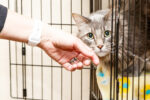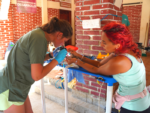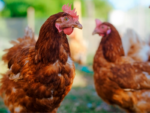Category: Blog
-
The New CVMA Code of Practice…for Cats
The CVMA Code of Practice for the Care of Domestic Cats was released in July 2025. Originally published in 2009, the standards were used to promote humane treatment of cats in a variety of settings. Written by Dr. Elissa Bessonette, DVM I recently was asked to provide a witness statement for an Animal Protection Act (APA) violation. The animals were examined at a location removed from the property and a statement on the living conditions…
-
Beyond the Lecture Hall: Experiential Learning in Shelter and Community Medicine for Ontario Veterinary College Students
Written by Dr. Jamie Freeman-Braganca We’ve all been there – recently graduated, knowing the answer to the multiple-choice question of how to treat a patient’s disease but finding out that the cost of care exceeds our clients’ resources. How differently might we have approached these cases had we been exposed to the realities of…
-
The Lifesaving Work of Gender-Based Violence Animal Safekeeping Programs
Written by Sue O’Neill As provinces across Canada are declaring gender-based violence (GBV) an epidemic in Canada, it is evident that gender-based violence is happening in our communities and we can all play a role in supporting individuals experiencing GBV. Canadian Animal Health Institute (2022) shared survey results that demonstrate at least 60% of Canadians…
-
An Integrative Approach – The Emergence and Importance of Veterinary Social Work
Written by Dr. Sarah Jane Lokaisingh When people think of visiting the vet, their minds naturally turn to the health and well-being of the animal – but is that the whole story? Beneath the surface of every veterinary visit lies a quiet tangle of human emotion. Behind every companion animal’s health lies a team of…
-
Fast Meets Last: The Truth About Mixing Local Anesthetics
Written by Dr. Tracy Satchell Mixing lidocaine and bupivacaine is a controversial topic but the idea is simple: lidocaine acts fast, bupivacaine lasts long, so mixing them should give you the best of both worlds. But does it actually work that way? Let’s find out. Mechanism of Action Both lidocaine and bupivacaine are local anesthetics…
-
Ringworm – To plate or PCR?
Written By Dr. Wesley Cheung, DVM Ringworm remains a challenging condition to manage in shelter dogs and cats, due to its long incubation period, risk of re-infection, limitations in diagnostic test options, long and frustrating treatment course, and zoonotic potential. Effective diagnosis and management are important to minimize unnecessary treatments, prolonged stays, and strain on…
-
Understanding the Impact of Cat Socialization on Post-Adoption Welfare: Insights from a Groundbreaking Study
Written By Dr. Jacklyn Ellis, PhD Many well-meaning cat lovers dream of a world with no homeless cats. While in theory this sounds wonderful, implementation comes with some practical and moral questions for animal shelters. What should they do with adult cats who have had little to no experience with humans and thus do not…
-
A Why and How For Famciclovir In Kittens
Written by Dr. Michelle Meckelborg Feline Upper Respiratory infection (URI) has long been an important disease complex in shelter medicine. Historically, efforts were focused on identifying pathogens and crafting effective treatment protocols with many shelters defaulting to euthanasia to prevent spread of disease. With greater understanding of the negative effects of sheltering animals came the…
-

Non-Surgical Sterilization using Suprelorin (Deslorelin Implant): A Practical Option for Veterinarians Serving Remote Communities
By Dr. Hannah Weitzenfeld For decades, ovariohysterectomy and castration have been the standard methods for controlling fertility in North American dogs and cats. While effective and permanent, these procedures are resource-intensive, requiring anesthesia, surgical equipment, a licensed veterinarian, and trained support staff. The Rise of Non-Surgical Contraception Recently, non-surgical contraception has gained traction as an…
-

The ABCs of Feline Herpes
By Dr. Tracy Satchell, DVM, MS Note to Reader: This blog post has 2 parts; the first part briefly discusses the feline herpes virus and upper respiratory disease, and the second part touches on a research paper that was recently published about the isolation of gammaherpesvirus in cats. Little is known about gammaherpes in cats…
-
WHO List of Medically Important Antimicrobials
By Dr. Linda Jacobson, Toronto Humane Society/CASCMA The primary purpose of this blog is to draw readers’ attention to two documents that every veterinarian and technician should be aware of. (Yes, technicians too. Just as you have a responsibility to challenge your veterinarians on inadequate analgesia, you should challenge them on antimicrobial stewardship. Future generations…
-

Spectrum of Care – What it is and how to put it into Practice
(This blog is a summary of my notes and impressions from the excellent talks presented by Drs. Jason Stull, Michelle Evason and Jason Coe at the OVMA conference 2024, for CASCMA’s Accessible Veterinary Care track.) By Dr. Linda Jacobson, Toronto Humane Society/CASCMA What is spectrum of care? “Spectrum of care” (SpOC) is a term that…
-

‘Hacking’ Kennel Cough: Shelter Medicine Insights for our Canine Respiratory Woes
A Blog by CASCMA Board Member, Dr. Hannah Weitzenfeld, DVM Mystery US Canine Respiratory Illness With the recent apparent increase in Canine Infectious Respiratory Disease Complex (CIRDC) in community and shelter dogs across the US1, many of us are looking at what could be causing this, and how we might approach a severe outbreak in…
-

Nitty Gritty on the Itty Bitties – Feline Congenital Hypothyroidism
By Dr. Tracy Satchell, Shelter Veterinarian, City of London When people find out I’m a veterinarian, I’m often asked, “What’s your favorite animal?”. I should probably say that I love all animals equally or declare that I couldn’t choose just one because I love them all! But that’s not the truth, for me the answer…
-

Supporting the Community with Pet Food Banks – What You Need to Know About Best Before Dates
Dr. Linda Jacobson, Toronto Humane Society (with grateful thanks to Kyrsten Jade Janke) Recent national survey data1 showed that 21% of pet owners struggled to access non-veterinary care during the pandemic, and the greatest need was for pet food. Companies and individuals regularly offer us donations of short-dated products, or products that are past their…
-

California Shelters Study – Harbinger for Canadian Shelters
By Dr. Michelle Meckelborg, Shelter Veterinarian, Director of Animal Health, Edmonton Humane Society Equitable public access to veterinary care is a hot button topic in the shelter and community medicinecircles. A survey recently published by the Program for Pet Health Equity out of the University ofTennessee approaches the topic from a different perspective – instead…
-
What Does a Positive PCR Really Mean? Lessons From Ringworm, Parvo, Panleukopenia And COVID-19
By Dr. Linda Jacobson, Toronto Humane Society/OSMA In the shelter, we frequently refer to Dr. Scott Weese’s diagnostic advice: “Never do a test without a (good) reason” and “Never do a test without a plan to use the result”. To this one might add: “Never do a test whose results you are unable to interpret”. This last might seem odd in…
-

Beyond “Doing Better”: Ordinal Rating Scales to Monitor Behavioural Indicators in Well-Being of Cats
By Dr. Shelley Hutchings, Chief Veterinarian at the Ottawa Humane Society Jacklyn Ellis, of Toronto Humane Society, published this article on a new tool to assess the well-being of cats in a shelter setting. This evaluation tool uses four ordinal scales to assess different behavioural aspects of a cat’s well-being. The four scales, which are…
-

Rabbit Hemorrhagic Disease: What Shelter Practitioners Need to Know
Written By: Emilia Wong Gordon, DVM, DABVP (Shelter Medicine Practice) Rabbit hemorrhagic disease (RHD) should now be on the radar of every shelter veterinarian in North America. This disease is caused by Rabbit Hemorrhagic Disease Virus 2 (RHDV2), a hardy calicivirus that resists freezing and many household disinfectants. Mortality rates in North American rabbit populations…
-

There’s No Such Thing As An Ugly Bunny! Rabbit Spay and Neuter Pearls
Blog by Dr. Linda Jacobson, Toronto Humane Society/CASCMA – material from Dr. Jennifer Farr’s talk, “Overcoming Rabbit Anesthesia and Surgery Challenges” at the September 12 CASCMA CE Day Dr. Jenn Farr, from the Hamilton/Burlington SPCA, literally knows her bunnies inside and out. She reminded us early in her talk that there’s no such thing as…
-
Positive Doesn’t Need to Be Negative: Adopting and Living With an FIV-Positive Cat
By: Dr. Linda Jacobson, President, Canadian Animal Shelter & Community Medicine Association This is a repeat of a blog Dr. Jacobson guest-wrote for the OSPCA recently. The content is mostly geared toward prospective adopters, but should be of interest to other shelter staff, including medical staff. (Photos – Toronto Humane Society). FIV stands for “feline…
-
When A Beloved Pet Dies: The Best and Worst Things to Say to People in Grief
Dr. Lianna Titcombe, BScH, DVM, CHPV As more and more animal shelters across Ontario are offering client-present euthanasia, you may find yourself having more interactions with the owners of the pets in your care. This may come with some initial worry and stress for you, but more than likely you’ll experience relief and satisfaction instead.…
-

Decreasing Barriers: An Adoption Strategy for Big Dogs in an Open Admission, Managed Intake Facility
By Dr. Esther AttardDirector, Toronto Animal Services; Board Member, CASCMA Toronto Animal Services is an open admission, managed intake facility. We have noticed animal populations on the increase when compared to 2021. In 2021 during the time period of January 1 – June 12, data reports indicate intake of 1,435 animals and in 2022, during…
-

Sun, sand, sea turtles, and surgical protocols. The ins and outs of a large volume spay/neuter campaign in Mexico
By: Natalia Hanson, Co-founder, Humane Outreach for Latin Animals Picture this: sun, sand, sea, warmth, all while helping animals and the communities where they live. Sounds lovely, doesn’t it? And it is! There’s no doubt about it, and it is one of the many perks of volunteering abroad. This blog, however, isn’t meant to be…
-

Bird Flu (Avian Influenza) and You – How Shelters Should Manage Birds During HPAI Outbreaks
Bird Flu and You – How Shelters Should Manage Birds During HPAI Outbreaks
-
High-Quality, High-Volume Spay Neuter; if you can’t beat ‘em, join ‘em!
By Dr. Tracy Satchell For many pets across the world, access to veterinary care is a luxury. A 2018 study by the Access to Veterinary Care Coalition found that over 25% of US pet owners are unable to afford basic veterinary care, such as vaccinations, parasite control, and spay/neuter [1]. In this same study, the…
-
The Rural Animal Shelter in Ontario: an Overview of Joys, Challenges and Future.
By Dr. Shalini Ramsubeik Ah, rural Ontario! The natural beauty, serenity and people are just a few reasons most of us will drive hours to go there for an escape. Two years ago, I began working at a veterinary clinic in Cavan, a rural region in Eastern Ontario. Within the first week, I began to…
-
Welcome To Being A Mini-Public Health Agency
By Dr. Linda Jacobson DVM I recently learned a new term: epistemic trespassing. “Epistemic trespassers are experts who pass judgment on questions in fields where they lack expertise.” (I don’t know the term for non-experts who pass judgment on questions in fields where they lack expertise!) We are all super-familiar with this behaviour during COVID-19.…
-
Veterinary Staffing Shortages – What does this mean for your shelter and pets in your community?
Shelters and rescues are also feeling the pressure from veterinary workforce staffing issues. Many shelters rely heavily on veterinary technicians and veterinary assistants for operational needs, and at the Ottawa Humane Society these positions have recently been more challenging to fill.
-
Veterinary Volunteering Abroad
By: Hanna Booth, CASCMA Board of Directors Now that the world is opening up to travel again, I’m sure many of us are craving to see somewhere new. Have you considered a vacation that incorporated some veterinary volunteering? There are many awesome animal rescue/ spay-neuter organizations around the world that are eager and grateful to…
-
Canadian Import Regulations and Animal Shelters
By Dr. Steph Black Many of us welcome the new dog importation laws with a sigh of relief knowing that it is a small step towards avoiding future atrocities like that seen in June 2020. In June of 2020 hundreds of puppies arrived from the Ukraine, some dead and many others very ill.1 This prompted…
-

Animal Control Intake of Free-Roaming Cats
Written by: Wesley Cheung, BVSc. Toronto Humane Society NACA has recently released a position statement on animal control intake of free-roaming cats. Summary: It is the position [policy] of the National Animal Care & Control Association that, at every opportunity, officers should [will] work to educate the public regarding humane and responsible co-existence and care…
